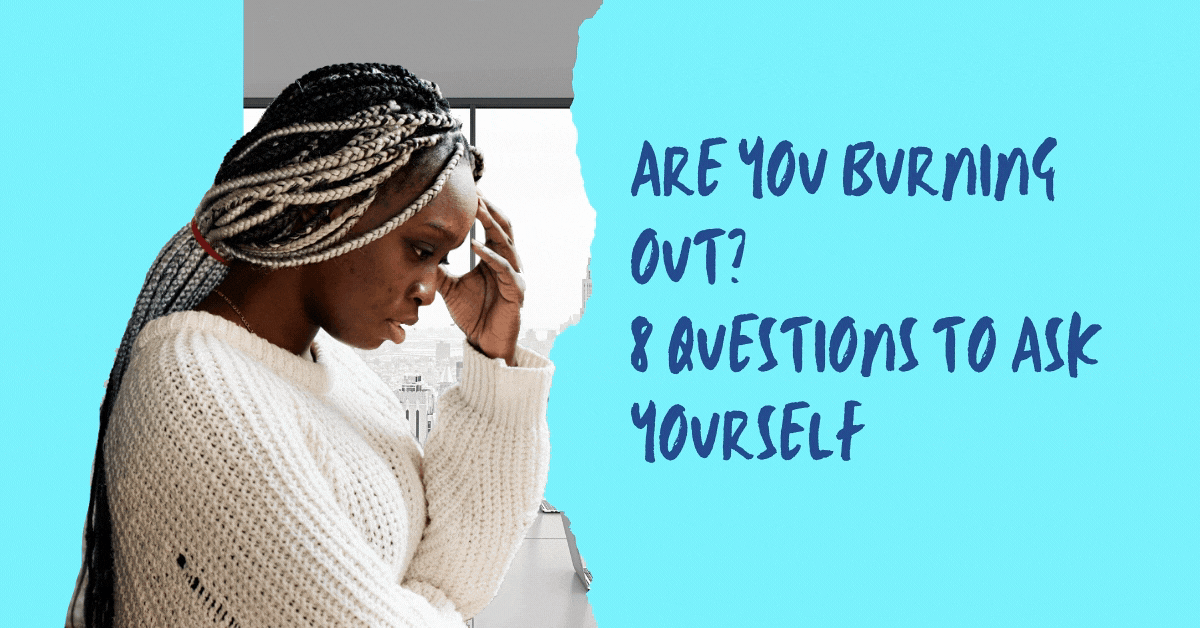I thought about writing this blog piece like one of those quizzes that used to be on the back pages of Seventeen and Cosmo where each question would offer several answers of varying point levels and you'd pick one answer per question, tally up your points at the end, and match your score to one of several possible results.
But then I realized that someone suffering from burnout (or on the cusp of it) probably didn't need more busywork added to their plate.
That's especially true during a pandemic that's already stretching our mental resources thin. An August FlexJobs survey found that 75% of people have experienced burnout at work and 40% have experienced it specifically during the pandemic.
So instead, I've done away with the addition. Here are eight simple yes-or-no questions to ask yourself about burnout. If you respond "yes" to more than one or two of them, proceed from there to the second half of this article, where I've shared tips for healing from burnout and preventing it in the future. If most of your answers are "no," I congratulate you on finding the elusive work-life balance and/or having built a career that works for you and/or finding a supportive company and boss and/or being impervious to the stress that wrecks us lesser beings. In all seriousness, if that's you, please do leave tips for maintaining calm and avoiding burnout in the comments before you close out of this tab and go on with your day.
8 questions to ask yourself about whether you're burning out
Per the World Health Organization, burnout is a work-specific issue defined as a "syndrome conceptualized as resulting from chronic workplace stress that has not been successfully managed." It goes farther than having a rough day or week and refers to a general sense of exhaustion, cynicism, and ineffectiveness at work.
Based on a guide to burnout from the Mayo Clinic, here's what to ask yourself about whether you're burning out:
- Have you been feeling less capable at work?
- Are you feeling more exhausted than usual?
- Would your coworkers or clients say you've been acting more irritable or impatient than normal?
- Do you feel less motivated to do work?
- Have you found it hard to concentrate on your work responsibilities?
- Do you feel less satisfied by your achievements than you have in the past?
- Do you find yourself wanting to call in sick more often?
- Have you experienced physical symptoms like fatigue, headaches, or stomach issues?
What to do if you're burned out
You can approach burnout in one of two ways. The first focuses on treatment and the second focuses on prevention. For the highest chance of successfully reducing burnout over time, you should work within both approaches.
First, you can seek to cut it off at its source by fixing the root cause of burnout. Some of those causes and ways to address them include:
- Unclear job expectations. If your role has changed recently or you've gotten a new manager, you might not have a clear idea of what it is that you need to do to succeed, making work feel like an ambiguous mess of stress. To fix it, sit down with your boss and go over what you understand that's expected of you, including key responsibilities and the metrics that will measure how you're doing on them, and ask your boss to correct your understanding or to fill in any gaps.
- Unreasonable pressure. Whether you're regularly asked to complete tight-turnaround work, forced to make do with less resources than you need, or given more work than you can complete, feeling sustained pressure at work can be one of the major factors behind burnout. Flag your situation to your boss, and, if they don't engage well, to your HR liaison, and ask what changes to timelines, processes, schedules, or workflows can be made to make things a little less stressful. This might not be possible in all fields, like for paramedics, for whom no amount of workflow magic will reduce the time pressure they sometimes face, so keep that in mind, too.
- Unfair treatment. If you're facing workplace issues like bullying, favoritism, or being underpaid for your work, it's not surprising that you're having a hard time feeling fulfilled by it. These are some of the thorniest issues to unpack at work, but if you think you can do so without further endangering your mental health or job security, you owe it to yourself to try. Bring it up in your next one-on-one with your manager or consider going directly to another manager in your department or to HR if it's your manager that is the problem.
- Overall lack of job satisfaction. Have you ever felt fulfilled at work? If not—if this bout of burnout is just a more intense version of the malaise you've long felt upon starting your workday—consider switching your job. Do some serious reflection on what kind of work has made you feel satisfied and look at job boards to see what else is out there. If you're going to spend the majority of your waking hours working, try to make sure you're not stuck in a role that drains your energy and gives you nothing in return.
Second, you can reduce feeling burned out by changing how you react to stress. Even the best job will include some tough moments, and you need to have a robust mental toolkit for responding to them. Keep this advice for approaching stress in mind:
- Set boundaries. You're paid to do a specific job—not to worry about that job for every second of every day. Utilize notification settings for Slack, email, and work calls to make sure that you're not getting dragged into work updates after work hours. Set up a system that works for you and don't feel bad about using it. The email can wait.
- Prioritize activities that give you energy, especially if your work doesn't. It's not enough to just stop working and expect energy to flood your system anew. You need to identify the things that bring you that sense of excitement and joy, whether that's cooking, reading, talking with a friend, working out, meditating, or being creative. Set up your day so that you always have time to do something just for you at the start or end of every work day.
- Treat yourself like you would a baby. No, not with mobiles and pacifiers but yes with serious commitment to your basic human needs. It's maddeningly simple: getting enough sleep, eating healthy foods, being connected to loved ones, and taking care of your brain (like via meditation and therapy) are the building blocks for a stable mental and physical state that lets you respond to stress without it taking over your life.
Note that neither approach includes advice like "take a vacation."
Getting a few days' respite from your problems won't make them go away, and even if two weeks off was enough to soothe your stress and re-energize you, you'll just feel depleted and burned out all over again when the vacation high has faded.
To really address burnout in your life, you need to find a healthy work environment with clear expectations, good communication with your manager and team, and fair treatment, and cultivate a personal approach to work and life that prioritizes your mental and physical wellbeing. It might seem like to fix work burnout, you have to put in even more work. That's true. You do.
But let me tell you: it is so thoroughly worth it.




